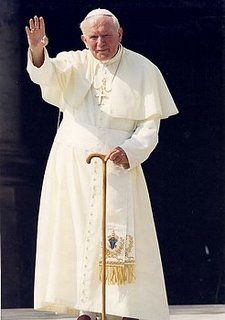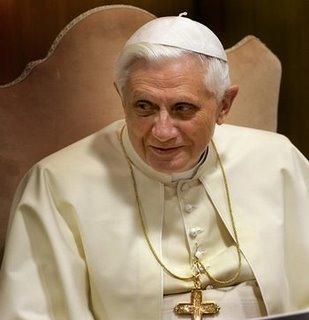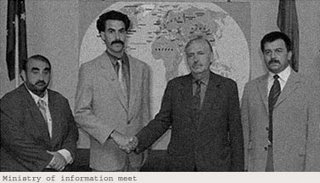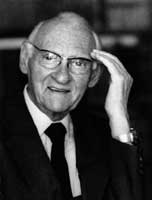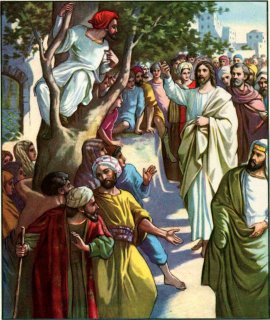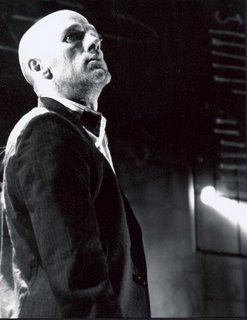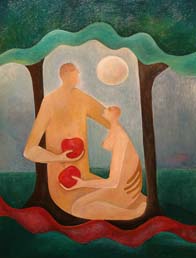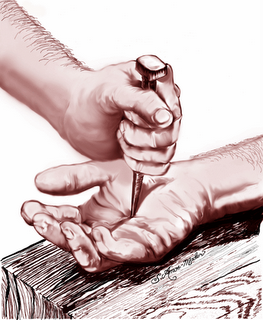After a lunchtime discussion yesterday with several people who know far more than I do about the sacred liturgy, I re-read the late Msgr. Klaus Gamber's book
The Reform of the Roman Liturgy: Its Problems and Background. This book is really two books co-published together in English by
Una Voce and The Foundation for Catholic Reform in 1993 and distributed by Roman Catholic Books, which has some relationship with Ignatius Press.

In reading a translated excerpt then-Cardinal Joseph Ratzinger wrote for the French edition of the book, it is impossible not to see the significance of Gamber's writings for his own thinking about and writing on the liturgy. Another connection is that while Herr Doktor Joseph Ratzinger was teaching theology at the University of Regensburg and his brother, Msgr. Georg Ratzinger, was liturgy and music director at Regensburg's Cathedral of St. Peter (pictured to the left), Msgr. Klaus Gamber, who passed away in 1989, headed the Liturgical Institute in Regensburg.
"What happened after the Council," writes the then Prefect for the Congregation of the Doctrine of the Faith in his introduction, was that
"in the place of the liturgy . . . came fabricated liturgy". According to the pre-Benedictine Cardinal Ratzinger, the
"organic, living process of growth and development over centuries" was abandoned and replaced by
"a manufacturing process", that produced
"a banal on-the-spot product". In this same introduction, he writes,
"Gamber, with the vigilance of a true prophet and the courage of a true witness, opposed this falsification" and
"taught us about the living fullness of a true liturgy".
It is my belief after re-reading Gamber's book last night, that it gives us a road map for what Joseph Ratzinger, as Pope Benedict XVI, hopes to accomplish in his
reform of the reform of the Sacred Liturgy during his pontificate. He is in an ideal position to accomplish this reform because, after the promulgation of
Liturgiam authenticam in the latter years of the pontificate of Pope John Paul II, and, for English-speaking Catholics, the establishment of
Vox Clara to oversee the work of ICEL in the translation of the
editio typica of the sacred rites, which are always in Latin, there is currently underway a new translation
Missale Romanae into several modern languages.
There are three reforms that the Holy Father seems eager to accomplish. The first has already effectively been done. It is the correct translation of the institution narrative of the eucharistic prayers of the Latin
pro multis, which in the 1969 missal was rendered
for all. Last Friday, 17 November 2006, the Congregation for Divine Worship and the Discipline of the Sacraments communicated that, at the
"direction" of His Holiness, Pope Benedict XVI, the rendering of the Latin
"pro vobis et pro multis", which, in the current missal is translated
"for you and for all so that sins maybe forgiven" in the liturgical consecration of the cup, is, in all future translations of the
Missale Romanae to be rendered
"for you and for many". On page fifty-five of
The Reform of the Roman Liturgy, Msgr. Gamber writes,
"Pope Paul VI saw fit to alter the words of Consecration and Institution, unchanged for 1,500 years - a change that was neither intended by the Council nor of any discernible pastoral benefit. Truly problematic, in fact truly scandalous, is the translation of the phrase pro multis as 'for all,' a translation inspired by modern theological thinking but not to be found in any historical liturgical text." Lest the theological point Gamber is making here be misunderstood, there is an important footnote, number 65, to which we must attend:
"In his exegesis of Heb 9,28, St. John Chrysostom explains quite succinctly: 'He was offered but once to bear the sins of many. Why does he [the author of Hebrews] say "of many," and not "of all"? Because not all had faith. Although He died for all, as far as He is concerned, to save all, His death voiding the downfall of all mankind, yet He did not take away the sins of all, because they themselves did not want Him to do this'." Gamber readdresses this whole issue later in an addendum to the book, that runs from page 185 to page 193, and is entitled
"The concept of the Sacrifice of the Mass in the Early Church: Or, Why the Translation of 'For You and For All' Is Wrong".

The second reform, which seems to be in the works, is the granting of the universal indult for priests to celebrate mass according the missal of 1962, which was not the last approved Latin missal, the last was what Gamber sees as the missal containing the authentic reform called for by the fathers of the Second Vatican Council, with the mass still in Latin, in 1965 (a very good year). Granting of the universal indult to celebrate mass according to the 1962 missal would supercede the current indult, granted by Pope John Paul II, that ended the suppression of the Latin Mass allowing its celebration only at the discretion of the local bishop. Granting such an indult universally would effectively accomplish what Gamber called for in a chapter of his book entitled
"Attempting to Resolve the Problem". The best way to resolve the problem, according to Msgr. Gamber, is to allow the co-existence of two distinct rites in the Western Church. The first is what he calls the
ritus modernus, or modern rite, also known as the
novus ordo, the new order, which is the rite we use now. Gamber does not challenge the validity of the
novus ordo, but he does challenge whether its creation, or, to stick with Ratzinger's term, the
"fabricated liturgy", and its promulgation was licit. In other words, he does not believe Pope Paul VI had the authority to either promulgate a new
ordo missae, or to supress the Latin mass.
He rests his case on the Constitution of the Second Vatican Ecumenical Council,
Sacrosanctum Concilium, by insisting that in this constitution the Council fathers did not authorize what Pope Paul VI did. Rather, Gamber insists, what was called for by the Council fathers in Article 50 of
Sacrosanctum Concilium was
"a revision of the traditional Ordo Missae". What Gamber questions most of all, is whether what Pope Paul VI did was pastorally necessary or in any way prudent. Gamber, conceding that what is done cannot be completely undone, concludes that the
ritus modernus should exist in the Latin Church along with the ancient
ritus Romanus. The
ritus modernus, according to this proposal, should exist only on an
ad experimentum basis in order to see if, over time, it
"is here to stay". It is difficult to see how this could be carried out without creating problems greater than those Gamber seeks to rectify. These problems that Gamber, as a liturgical scholar and not a canonist, theologian, let alone a bishop, ignores arise from the ecclesiological implications, theological, juridical and pastoral, of such a co-existence. This is no small problem as the concerns recently raised by the
French bishops to the possibility of a universal indult shows.
The third change, which would be far more difficult, if not downright impossible, to accomplish given the money and effort spent on changing churches to accomodate the
novus ordo of 1969, which turned the priest to face the congregation, is turning the priest back away from the congregation. Such a change would also lead to a lot of resistance and reignite divisions among Roman Catholics. Nonetheless, if Gamber's book offers a roadmap of what Pope Benedict XVI hopes to accomplish in his
reform of the reform, which is my thesis, this uncalled for and destructive innovation is so grave, that turning the priest back around would also apply to the
ritus modernus. The Holy Father, prior to becoming pope, wrote about the necessity of doing this in several of his published works. There continue to be a stream of books by young scholars advocating a return to the tradition on this matter. Gamber is most persuasive in his arguments against the priest saying mass
versus, that is, facing, the people. Gamber makes a persuasive case against this innovation and shows that there seems to be no liturgical historical precedent and no theological or pastoral justification for such a radical departure from the traditon.
"Concerning the fashionable altar 'facing the people,'" writes Benedictine abbot, F. Gerard Calvet, in his
"Preface to the English Edition",
"let us emphasize with Cardinal Ratzinger the serious theological mistake it communicates". He then quotes Ratzinger from his introduction to the French edition of Gamber's book:
"We risk seeing the assembly turning itself into a closed circle, in the name of community life. Liturgical education will have to work most vigorously against the concept of autonomous, self-sufficient assembly. The assembly does not converse with itself, but sets out unanimously towards the coming Lord."Of course, there are good arguments to be made for the other side of the issue, but a debate is not what I am conducting, as I am simply not qualified. What this post constitutes is my
take on what we can expect during this pontificate as pertains to what number 10 of
Sacrosanctum Concilium tells us
"is the summit toward which the activity of the Church is directed; at the same time it is the font from which all her power flows. For the aim and object of apostolic works is that all who are made sons of God by faith and baptism should come together to praise God in the midst of His Church, to take part in the sacrifice, and to eat the Lord's supper"- the holy sacrifice of the Mass.






